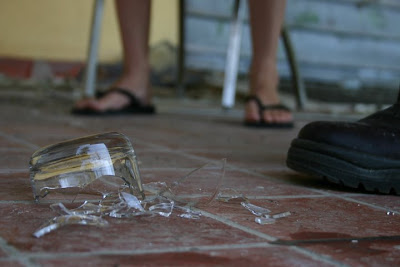 When enthusiasm trumps technique
When enthusiasm trumps technique
By Alison Broverman
Hey, I’m back! I know what you’re thinking. You’re thinking: “wow, this girl must have some kind of crazy dirt on Ian that he doesn’t want spread around. Why else would he keep turning his usually thoughtful blog over to her insane ramblings?” Well, part of our deal was that I’d never tell one way or the other. So you’re stuck with me again. And I’m not linking you up to any exploding cows this time.
Have you noticed the trend over the past few months of films celebrating the redemptive power of DIY art – Be Kind, Rewind and Son of Rambow are the two main examples, and Honeydripper dabbles in that theme as well, though the art in question is music, not film. In the former two films, amateur auteurs recreate their favourite movies with their own limited resources (and way more moxie than any studio has ever shown). In Be Kind, Rewind, when Mos Def and Jack Black are sued for plagiarism, they make their own movie instead, with help from the entire neighbourhood. It’s a powerful act of community, and everyone involved feels important and validated as they watch the screening. (I haven’t see Son of Rambow yet, but I assume it has a similarly feel-good ending. If you’ve seen it and I’m dead wrong and they all, like, die at the end or something, please let me know.)
And in Honeydripper an unknown (but stupendously hot) guitarist plays a really rocking set and saves Danny Glover’s bar from bankruptcy. Oh, just see it. It’s a beautiful film about how art will set you free.
Continuing the trend this summer is Hamlet 2, which comes out in August and basically looks like the greatest film of all time (at least since Waiting for Guffman). Go watch the trailer! Go go go!! Now! I’ll wait! Did you watch it yet? (This quote, incidentally, sums up my exact feelings for We Will Rock You: “It was stupid, but it was also theatre!”) I can’t wait. Why isn’t this movie opening RIGHT THIS SECOND?
Why won’t you shut up about movies already? You’re writing a post for a theatre blog. Yeah, yeah. OK. I won’t shut up about these movies, because they are all thematically connected to my point (I do have one, for serious): community theatre is good for the world.
What’s that, snobby little devil on my shoulder? “Community theatre is for amateur hacks who don’t deserve to be on a real stage.” Whoa. You stop that. That’s pretty harsh. Who “deserves” to be onstage, anyway? Theatre is empowering. Creating any kind of art is empowering, but performing on stage in front of a laughing, applauding audience is . . . well, if you’re reading this blog, you probably know something about it. There’s nothing like it.
The energy at a community theatre performance is really something special. Everyone in that theatre is so excited to be there. So excited that they’re doing it for free. A good portion of the audience know the performers and are so proud and delighted to be there. (Sometimes this happens at professional theatres too – ask me about Pirate Tim’s dad sometime.) At a community theatre production, even the audience has a lot invested in the show, which is not something you can say for most professional productions, where the audience has to be convinced to care.
I know. I was skeptical too until a friend of mine dragged me to the Civic Light Opera Company production of The Rink. Aside from all the adorably absurd details that you would never get at a professional show (like a 17-year-old – cast in a role meant for a 30- or 40-something – singing an earnest love song to a woman 30 years his senior), the unbridled enthusiasm of everyone on that stage was so refreshing and inspiring. Something emanated from the stage that I didn’t even realize I had been missing at professional shows: pure joy. (Plus, when the hell else are you going to see a production of The Rink?)
 Even better is the high school play. The nerves and the hormones that are flying around your typical high school auditorium always make for a theatre experience that, if not exactly polished, is irresistible and electric. Unfortunately, you can’t go to a high school without knowing someone involved with the production. Otherwise you’re just some creep hanging out at a high school. (I miss having a little sister at Rosedale Heights! One year they did this awesome school-wide adaptation of Alice in Wonderland that somehow turned Wonderland into this incredibly powerful metaphor about the trauma and confusion of adolescence. It could only have happened at a high school, and it was such a unique theatrical experience.) Plus, only on a high school stage are you going to see a perfectly executed stage kiss, you know, with thumbs over the lips (I’m pretty sure that was because Romeo’s real-life girlfriend was not playing Juliet . . . )
Even better is the high school play. The nerves and the hormones that are flying around your typical high school auditorium always make for a theatre experience that, if not exactly polished, is irresistible and electric. Unfortunately, you can’t go to a high school without knowing someone involved with the production. Otherwise you’re just some creep hanging out at a high school. (I miss having a little sister at Rosedale Heights! One year they did this awesome school-wide adaptation of Alice in Wonderland that somehow turned Wonderland into this incredibly powerful metaphor about the trauma and confusion of adolescence. It could only have happened at a high school, and it was such a unique theatrical experience.) Plus, only on a high school stage are you going to see a perfectly executed stage kiss, you know, with thumbs over the lips (I’m pretty sure that was because Romeo’s real-life girlfriend was not playing Juliet . . . )
Am I saying that quality should lose out to effort and we should stop going to professional shows in favour of the community theatre? Of course not. Quality and skill are very important to my enjoyment of a show, of course (now, sometimes these things are found in community theatre performances – the Alexander Players production of Guys and Dolls, which I saw last week at the Leah Posluns Theatre, had a few very nice surprises among the performances). But I do think that a good community theatre experience can remind us why we make theatre in the first place. Because it is damn good fun to put on a show.
Alison Broverman is a Toronto-based theatre artist and freelance arts reporter for The National Post.
You’re absolutely right about that, AB. I’ve had a recent similar experience myself. A lot of that passionate “amateur” spirit needs to be transplanted to (fill in name of drifting, complacent “professional” Toronto theatre company here).
righto! that’s how i got into this racket – doing community theatre at St. Aidan’s church in ye olde Beaches (yeah, that’s right – beachES). these shows were not great, or well, even mediocre, but they got me hooked on the fun and excitement of putting a show together.
incidentally, for all you slings and arrows fans, that’s the same church they put on Lear in full community theatre style in season three -the same stage where William Hutt plays Lear for the last time – passing the torch to Sarah Polley in the awesomest conclusion of a Canadian tv show ever.
the craziest part was -they use an actor’s POV camera for a lot of the shots, so what they were filming was EXACTLY what i saw through my very own eyes when that was how i was rolling in the mid 90s.
I’ve been hooked ever since my siblings and I used to write and put on plays for family during every holiday get-together. I don’t know about the audience, but it was very exciting for us! Even in a musty old basement.
“A good portion of the audience know the performers and are so proud and delighted to be there.”
I think this is sometimes a source of shame for independent and community theatre makers. As if it’s some kind of admission that the only audience the show managed to scrape together was made of friends and family.
I like the idea of celebrating this kind of audience. Friends and family really do have an investment in the show, and, as you say, it adds to the excitement.